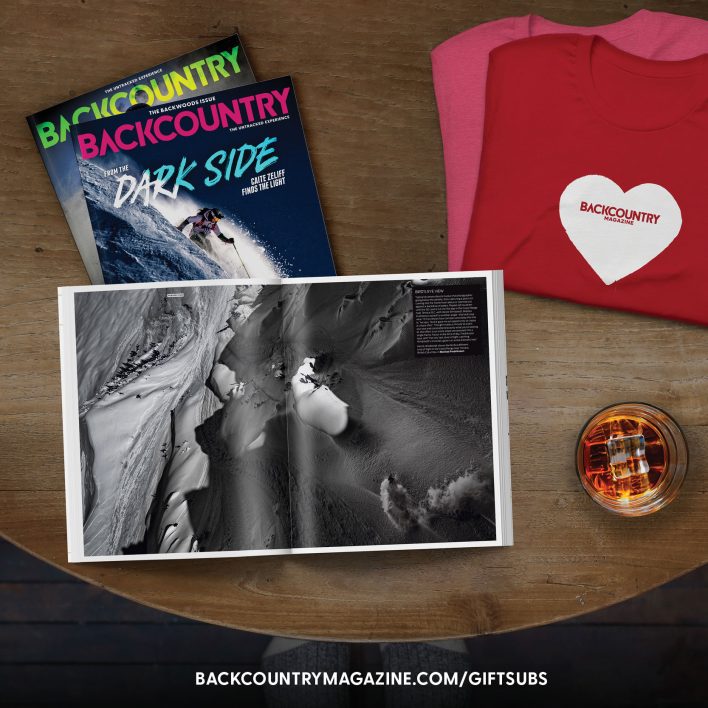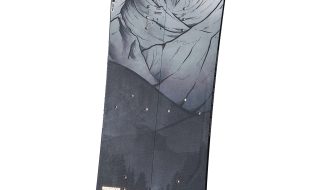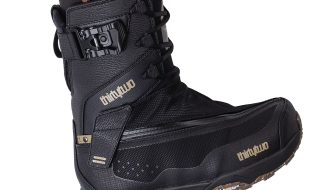After 10 films, the makers of the notorious Powderwhore ski movies are calling it quits. A post last week on the Utah-based production company’s Facebook page confirmed the news.
The men behind the movies are brothers Jonah and Noah Howell. The two have dedicated the last decade of their lives to telling real stories from the world of backcountry skiing, and their films are defined by unique personalities, lowbrow comedy, ambitious expeditions and countless jealousy-inspiring powder turns.
Drew Tabke caught up with Noah and Jonah to talk about their journey, why they’re hanging it up and what’s ahead.
Drew Tabke: Ten movies in total! Congratulations. When you started this journey all those years ago, did you have a plan, a vision of how far it would go?Noah Howell: Absolutely not.
Jonah Howell: No! No plan at all. I thought Noah was crazy. I was just waiting to see him fail, and he didn’t, so I started helping him.
DT: I heard you say you were going to quit a few times in the last few years, but you kept going. What kept you going during those years and why are you finally hanging it up now?
NH: Well, it turns out we’re actually going to make another film. Kidding.
JH: When we did Television in 2010, we nailed this really high level of big-mountain riding up in Alaska, and it was everything we’d hoped we could do with a tele ski movie. We felt like we’d accomplished this goal of ours, like, “Look at this! Tele skiers are awesome.” But then it was like, “Alright. “Now what do we do?” So after that, we really wondered if we were done. But the idea dawned on us to move toward a backcountry movie, and that reignited the excitement. It gave us way more stories, way more ideas, and reinvigorated the whole thing. This last one, Some Thing Else, was our Television for backcountry ski films, where we finally nailed it. So it felt like we could either try to make that movie again or just be done.
NH: I totally agree. But for me there were lots of other factors. We’re getting older and going on tour is hard. We’re showing up and just begging people to come out to see a movie, and it gets tiring and it’s hard on your soul after a while.
DT: After those first telemark-only films, you started incorporating other modes of riding. Was it an intentional decision to move away from being telemark-only? Do you even think it matters what you use to ride snow-covered mountains?
NH: One thing that did bother me was this religion, this cult around tele. Some telemarkers say, “Oh, it’s the ONLY way.” And you know what? No, it’s not. I think that attitude actually hurts telemarking. When it’s done well and when the snow is right, telemarking is one of the most fun things you can do. But there’s so many ways to ride mountains.
DT: On the flip side, you’ve got the ultralight, tech-binding crowd or the guys who only use fat skis with heavy touring bindings, and so it seems like each discipline runs a risk of falling into that cult mentality.
NH: For me all of that different gear is cool in different ways. On a powder day, you don’t want to bring your super skinny skis, or on a day when it hasn’t snowed in three weeks and you set out to traverse a mountain range, you don’t want to bring your 130mm-underfoots. So for me its like carry a quiver, be well rounded and get your head out of you ass.
DT: Would you say you are outright “anti-ski area?”
NH: I think they have a time and a place. Definitely a place. But I would rather ski one good run—no, even one bad run—away from the resort. I get to go where I want, by my own means. [Resorts are] a safe place to play, though. I see how resorts work for some people.
DT: Did you ever film in a ski area?
JH: Never any ski segments. Only a couple of comedy bits during the first films.
DT: Noah, How did you get fired from your job at Deer Valley?
NH: Hey, I mean, that’s not where my bitterness toward ski resorts comes from. We built this jump after work and were working on our back flips and front flips.
JH: Yeah, but it was like the third time you’d been caught doing it, and they kept telling you not to.
NH: Yeah, but a couple of years had passed, and I thought they’d forgotten about it. And I was working like one day a month, so it wasn’t like a huge loss.
JH: Three other people and I were with him, but for some reason Noah is just the personality who stands out. No one else even got in trouble.
DT: Were there any segments you didn’t get around to making that you wish you could have?
JH: There’s a guy in Tahoe who backcountry monoskis. He made his own backcountry mono ski, and he’s done it all over the world. And we wanted to do it last year, but we never got around to it because Tahoe had such a bad winter.
DT: What about you, Noah?
NH: I mean, I have endless bad ideas that Jonah would filter out and shoot down and keep us on the right track.
DT: So was Jonah the voice of reason in the outfit?
JH: No, I just like to make it simple. Whereas Noah has these elaborate ideas, I’m like, “Well, how do we even make that happen?” Noah is more creative, I guess you could say.
NH: I’m just shitting ideas out all over the place, and Jonah is like the diaper just trying to keep it from getting too messy.
DT: What are some trips you’ve done multiple times and could keep doing forever, stuff that never gets old?
JH: Japan. Alaska.
NH: Alaska. Anything Alaska camping. It doesn’t even matter where. Just pick a range, pop a tent, spend two weeks, and you’re gonna have one of the best days of your life.
DT: A lot of my favorite stuff from the films were your character segments where you’d focus on unique individuals from the world of backcountry skiing. Who really stood out for you?
JH: Well, the funniest is Geoff, who was in our last movie. Funniest, scariest, craziest. But the most dedicated skier is Bob Athey.
DT: One of my favorites was Todd Stuart from PW05, which, like a lot of segments, seemed to be a more honest picture of backcountry skiing and the lifestyle surrounding it than you can get in any other ski media.
NH: What I hate about ski movies is that they’re so polished. It’s all action; it’s all so serious. But where are the people laughing and goofing off and having fun? And the characters in those films, they just try and make these perfect rock videos. So yeah, there was a bit of rebellion in what we did. Like, look, this is what people do. They use the “F” word. It bothered me that there wasn’t any of that out there.
DT: So what was the pushback from the industry, from your sponsors or from the audience for your more unfiltered content?
JH: Well, all those companies who dilute it and polish everything are still in business and we’re not, if that tells you anything. Take the name “Powderwhore.” It was a blessing and curse. Because if someone comes to a film called Powderwhore, that sets their expectations right from the start that we’re not as mainstream as the other stuff that’s out there. But as a business it I think hurt us a lot.
NH: It was a horrible idea.
DT: You’re like that band from Portland called Starfucker, but they changed their name to STRFKR.
NH: In the end, it was good. It allowed us to do what we wanted. And to us that was the tradeoff that we wanted to take. We’d stay small, and as long as the people support it, that’s good enough.
DT: So maybe it hurt you with some brands, but what about other brands in the industry who said, “You know what? These guys are authentic, and we are totally fine with publically supporting what they’re doing.”
NH: We definitely had some great support like that. The people who saw it as a positive recognized that we spoke to a core audience. Black Diamond supported us forever. Mountain Hardwear, Scarpa, backcountry.com, those guys never batted an eye. They wouldn’t promote us directly, but we were kinda like their dirty little secret that they were happy to work with as long as it wasn’t in public.
JH: Totally. Only the small, independent brands like FlyLow and Voilé, and Scarpa occasionally, would directly push our stuff by putting a post to social media saying, “Hey, we’re sponsoring these guys.” The other, bigger brands sponsored us but were never part of promoting us.
DT: What about escalation of consequence that seems to happen with backcountry skiing? From skiing low-angled pow in an aspen glade, to skiing big lines on an expeditions.
NH: When you nail a great segment or a great trip, you want more. And I think that is part of human greed and human nature. And it is really, really scary and dangerous when you’re filming and working with the avalanche dragon. Because you’re doing the exact opposite of what you should be doing in avalanche terrain. Your concerns are upside down—you don’t want tracks, you want deep snow, you want it steep, you want good light. You have all these concerns that, without the camera, should be secondary, and you have to keep that in mind. Especially when you’re not using a helicopter, you’re not guided and you’re way out there.
DT: Did that extended exposure to risky terrain play a part in making you want to call it quits?
NH: It’s a huge factor. I mean, we’re risking health often, and life perhaps, just for the reward of doing it. It’s not for the money—we’re risking our lives and busting our ass and would definitely be making more money working a regular job. It can be really dangerous if you’re not working with the right people, but even if you are and you do everything right, things can go south quick.
NH: Spending that much time in the mountains and covering that much terrain and trying to ski good snow in exotic locations—we did it safely or we got lucky over those 10 years. But it’s time to take the money off the table. Yeah, we’re good. Time to walk away. Though Jonah might want to double down.
JH: Well, I mean, I was the cameraman, so I didn’t really care. Those athletes should push it. Avalanche footage sells better than any other footage. The only footage we’ve ever sold as stock footage was when we had an avalanche with Andy Rosenberg. Just throwing that out there.
DT: So what are you going to do now? What does the future hold for the Powderwhore brothers?
NH: I’m going skiing. I want to continue doing what I’ve been doing, but without the camera, without the production responsibilities.
JH: We’ll see. I’m just trying to establish some jobs, figuring out how to make it work so I can ski a decent amount and still make a living. I’m not as dedicated as Noah to skiing, but I’d still love to go on a couple expeditions.
DT: Any segments you regret making?
JH: I mean, in all of the movies most of the segments I think are really bad.
NH: They’re hard to watch now, for sure.
DT: Really? You don’t like to watch the old films?
JH: No.
NH: No. It’s the quality. I mean we made such big leaps, it’s just hard to watch grainy footage, shaky camera work.
DT: Whereas your sense of humor with the comedy segments was always at a super high level.
NH: No, our sense of humor has just always been bad and has never changed, so there’s no big contrast over the years.
DT: Is there anything else you want to add? I mean, this might be the last time anyone talks about Powderwhores.
JH: I’d say we wish it were like Powder Magazine or Skiing or a real publication doing this.
—
For Megan Michelson’s December 2014 profile of Noah and Jonah Howell, pick up the December 2014 issue of Backcountry. You can buy all 10 of the Powderwhore films at powderwhore.com.


![[Illustration] Jamie Givens](http://backcountrymagazine.com/wp-content/uploads/2015/10/powderwhore_embed.jpg)








Finest closing words in just about any interview I’ve ever read. You guys are f’ing great and I’m gonna miss your work.
Something Else was friggin epic. The characters, the skiing, the pow, & the music. It all came together rather epically. I was instantly hooked on Powderwhore, only to find out it was the last one. Err, ah, well, okay. Let’s just go skiing then. Thanky, 😀